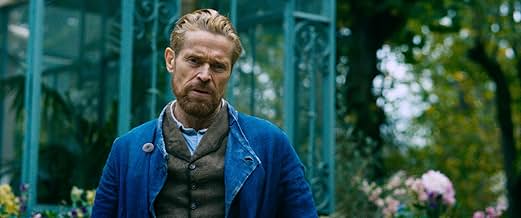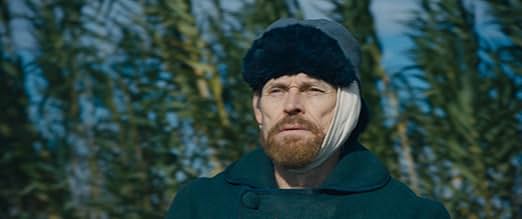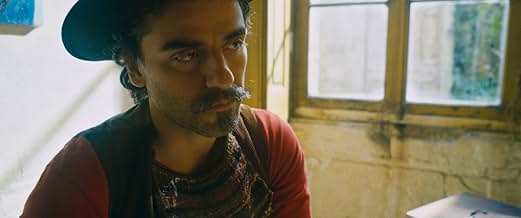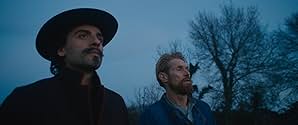IMDb-BEWERTUNG
6,9/10
42.795
IHRE BEWERTUNG
Ein Blick auf den Teil des Lebens des Malers Vincent van Gogh, in dem er in Arles und Auvers-sur-Oise (Frankreich) lebte.Ein Blick auf den Teil des Lebens des Malers Vincent van Gogh, in dem er in Arles und Auvers-sur-Oise (Frankreich) lebte.Ein Blick auf den Teil des Lebens des Malers Vincent van Gogh, in dem er in Arles und Auvers-sur-Oise (Frankreich) lebte.
- Regie
- Drehbuch
- Hauptbesetzung
- Für 1 Oscar nominiert
- 3 Gewinne & 16 Nominierungen insgesamt
Clément Paul Lhuaire
- Emile Bernard
- (as Clément Lhuaire)
Alan Aubert
- Albert Aurier
- (as Alan Aubert-Carlin)
- …
Empfohlene Bewertungen
Vincent Van Gogh's last days in the south of France are depicted in this heartfelt drama by Julian Schnabel. Willem Dafoe gives a powerful performance as the destitute, troubled painter who was not understood by those in his own time. As Van Gogh seeks to express his extraordinary eye for nature and portraits, those around him are either put off, wary or sometimes intrigued. His brother is his only real comfort.
A deliberately paced film with a mournful soundtrack, this will leave you in a contemplative state. It does not tell you everything about Van Gogh or when his self-isolation began but it does seek to offer insight into his profoundly troubled mental state. His demons are quite evident throughout the film- everything from his intolerant response to the curiosity of schoolchildren to his difficulty explaining his world to whatever doctor is examining him, Van Gogh is exemplified in Dafoe's anguished face. Schnabel, himself a painter, brings his own perspective in piecing this film together, especially in showing how Van Gogh paints and goes about his craft.
The film is not without drawbacks. Oscar Isaac is miscast as Paul Gauguin, the French painter whom Van Gogh couldn't bear losing company with. And Mads Mikkelsen gets minimal screen time in a very thoughtful performance as an inquisitive priest who recognizes Van Gogh's uniqueness. But this film is Schnabel's interpretation of Van Gogh and Dafoe's exemplary portrayal of him and in that regard it works quite well. Recommended.
A deliberately paced film with a mournful soundtrack, this will leave you in a contemplative state. It does not tell you everything about Van Gogh or when his self-isolation began but it does seek to offer insight into his profoundly troubled mental state. His demons are quite evident throughout the film- everything from his intolerant response to the curiosity of schoolchildren to his difficulty explaining his world to whatever doctor is examining him, Van Gogh is exemplified in Dafoe's anguished face. Schnabel, himself a painter, brings his own perspective in piecing this film together, especially in showing how Van Gogh paints and goes about his craft.
The film is not without drawbacks. Oscar Isaac is miscast as Paul Gauguin, the French painter whom Van Gogh couldn't bear losing company with. And Mads Mikkelsen gets minimal screen time in a very thoughtful performance as an inquisitive priest who recognizes Van Gogh's uniqueness. But this film is Schnabel's interpretation of Van Gogh and Dafoe's exemplary portrayal of him and in that regard it works quite well. Recommended.
The last years of Vincent van Gogh with his extreme sensitivity and mental instability. It's perfectly filmed with a colorful and adequate staging. And Willem Dafoe plays brilliantly!
This film doesn't follow the Hollywood structure. It's not a biography like you might expect, and the plot isn't defined. Instead, this is an attempt to get inside Van Gogh's head, and a brilliant one at that. Imagine being the world's greatest artist, with zero validation and constant ridicule by the establishment around you. That's the torturous state of being this film encapsulates and does it with purpose. At times, the cinema language gets more experimental than necessarily to accomplish its goal, but I commend the director for pushing the boundaries of standard filmmaking and letting us inhabit Van Gogh's mind for this brief period. I genuinely felt a loss for this escape from my own mind when Van Gogh passed. I recommend anyone involved with artistic or creative thinking to watch this film.
Loved the raw hand held camera work . The director shows the scene in such a that u can really enter into vincent's mind and can see his vision . Obviously the acting of Willem Dafoe was tremendous and he took the character to another level .
Vincent Van Gogh was a tortured soul that was, paradoxically, obsessed with beauty and wonder. Julian Schnabel (director) tries to give us a glimpse into the mind of the painter with this film and he delivers. This movie is not a biopic. It is more of an homage, an attempt to make us look at the world the way Vincent did.
With a dynamic camera, often hand-held, we wander around with Van Gogh (Willem Dafoe) trying to find interesting and striking images of nature, villages, people... The camera is always searching; different lenses, different angels, different distances... It finds new and inventive ways of filming. For example the split diopter is used, not to bring two objects into focus, but to blur par of the screen; and since Vincent had an eye condition, we are truly put in the artists shoes. Such a shame the movie at times loses itself in its eager to find yet another camera angle.
Sometimes a voice-over paints another image on top of what is shown. The score paints an atmosphere of ecstasy with a darker undertone. And Willem Dafoe paints an A+ performance, but he does it so well other actors sometimes disappear into his shadow.
Yet, this movie is an experience worth exploring. However it's tempo occasionally falters and instead of one long smooth stroke over the canvas, it sometimes feels more like a rough patchwork of different stories. It's sometimes messy, sometimes incredibly beautiful. Quite like Van Gogh.
This movie is not for everyone. Those who shiver when encountering vague, artsy-fartsy movies that call themselves art, better turn elsewhere. But those who can appreciate this way of filming and especially those who love Van Gogh's work, will adore this dreamlike exploration of Vincent's mind.
With a dynamic camera, often hand-held, we wander around with Van Gogh (Willem Dafoe) trying to find interesting and striking images of nature, villages, people... The camera is always searching; different lenses, different angels, different distances... It finds new and inventive ways of filming. For example the split diopter is used, not to bring two objects into focus, but to blur par of the screen; and since Vincent had an eye condition, we are truly put in the artists shoes. Such a shame the movie at times loses itself in its eager to find yet another camera angle.
Sometimes a voice-over paints another image on top of what is shown. The score paints an atmosphere of ecstasy with a darker undertone. And Willem Dafoe paints an A+ performance, but he does it so well other actors sometimes disappear into his shadow.
Yet, this movie is an experience worth exploring. However it's tempo occasionally falters and instead of one long smooth stroke over the canvas, it sometimes feels more like a rough patchwork of different stories. It's sometimes messy, sometimes incredibly beautiful. Quite like Van Gogh.
This movie is not for everyone. Those who shiver when encountering vague, artsy-fartsy movies that call themselves art, better turn elsewhere. But those who can appreciate this way of filming and especially those who love Van Gogh's work, will adore this dreamlike exploration of Vincent's mind.
Wusstest du schon
- WissenswertesWillem Dafoe was 62 when the film was released, 25 years older than Vincent van Gogh, who died at age 37.
- PatzerTheo tells Vincent at the hospital that he is now married. In reality Vincent received a letter from his brother on Dec 23rd 1888, in which he announced his engagement. Vincent feared that his brother would not be able to support him, once married. Additional to this he had the argument with Gaugin that night over Paul leaving. Mentally disturbed by all this he cut his ear off.
- Zitate
Vincent Van Gogh: Maybe God made me a painter for people who aren't born yet.
Priest: Possibly.
Vincent Van Gogh: It is said, Life is for sowing. The harvest is not here.
- Crazy CreditsThere's a mid-credits scene, where a Paul Gauguin quote is narrated.
- VerbindungenFeatured in Sven Uslings Bio: 2019 Års sämsta biofilmer (2020)
Top-Auswahl
Melde dich zum Bewerten an und greife auf die Watchlist für personalisierte Empfehlungen zu.
- How long is At Eternity's Gate?Powered by Alexa
Details
- Erscheinungsdatum
- Herkunftsländer
- Offizielle Standorte
- Sprachen
- Auch bekannt als
- Van Gogh en la puerta de la eternidad
- Drehorte
- Produktionsfirmen
- Weitere beteiligte Unternehmen bei IMDbPro anzeigen
Box Office
- Bruttoertrag in den USA und Kanada
- 2.294.915 $
- Eröffnungswochenende in den USA und in Kanada
- 92.856 $
- 18. Nov. 2018
- Weltweiter Bruttoertrag
- 11.519.666 $
- Laufzeit
- 1 Std. 51 Min.(111 min)
- Farbe
- Seitenverhältnis
- 2.35 : 1
Zu dieser Seite beitragen
Bearbeitung vorschlagen oder fehlenden Inhalt hinzufügen




































